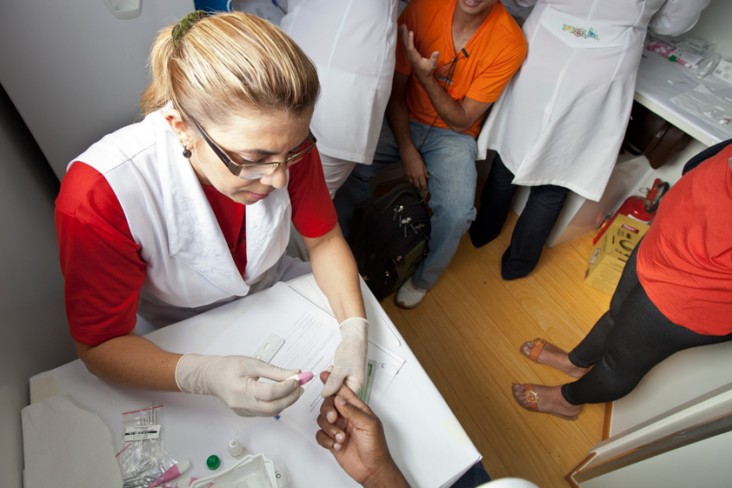
The theme for the 2013 World AIDS Day, observed on Dec. 1, was “Sharing Responsibility—Strengthening Results for an AIDS-Free Generation.” USAID's work in Brazil has strengthened civil society organizations to advocate for prevention policies, programs and strategies that address the country's HIV/AIDS epidemic, and has helped to build one of the world’s most effective HIV/AIDS prevention programs.
USAID has been working to combat the HIV/AIDS epidemic in Brazil with the U.S. Centers for Disease Control and the Brazilian Government since 2003, with the advent of the President’s Emergency Plan for AIDS Relief.
The Agency has also helped to expand social marketing for condoms, promote HIV rapid testing, and increase diagnosis among the most at-risk populations through a comprehensive voluntary counseling and testing program, Quero Fazer (I want to do it), that began in 2011. The program is planned for further expansion by the Government of Brazil.
On Dec. 1, awareness campaigns and voluntary counseling and testing activities promoted World AIDS day in Sao Paulo state in partnership with the state Secretariats of Health and Culture. The campaign to promote early diagnosis, “Be in the Know,” provided 600 rapid tests for HIV and syphilis through a USAID-supported mobile testing unit.
"The exam is private, simple, rapid, painless, and its results are confidential. For both HIV and syphilis, the early diagnosis ensures adequate treatment time, preventing the mother-to-child transmission and infection of the partners,” said Maria Clara Gianna, coordinator of the STD/AIDS state program.
To Beto de Jesus, who coordinates the Quero Fazer project, this type of initiative is very opportune. "It is important to establish partnerships of this nature between civil society and governments for voluntary counseling and testing initiatives," he said. "To ensure access to testing and early diagnosis is what will make the difference in combating the AIDS epidemic.”
Another important initiative of the Quero Fazer project began in November 2013. In partnership with the National Department of STD, AIDS and Viral Hepatitis of the Brazilian Ministry of Health, four workshops will be implemented until the end of 2013 to disseminate Quero Fazer’s methodology and to train 40 NGOs on HIV testing options.
The main objective of these workshops is to expand testing and diagnosis on days and hours not available in the traditional public health system. Fábio Mesquita, director of the National Department of STD, AIDS and Viral Hepatitis, says, “Expanding HIV voluntary testing for the ones in vulnerable conditions will be essential to fight the epidemic and stop the cycle of new infections.”
“The initiative is very important for the rapid diagnosis of HIV/AIDS," says de Jesus. "Within six years, the Quero Fazer project has been testing social technologies to expand access to the rapid testing. For us, it is an honor to be able to share this experience with the NGO community. It is necessary to expand the public system actions, and with this initiative, in partnership with the Ministry of Heath, we were able to reach persons that do not access the public health system.”
The first workshop, Nov. 25-26, focused on NGOs that assist sex workers. The second, Nov. 27 and Nov. 29, focused on gays and men that have sex with men. The third, Dec. 9 and Dec. 11, will focus on drug users. And the fourth, Dec. 11 and Dec. 13, will focus on transvestites and transsexuals.







Comment
Make a general inquiry or suggest an improvement.